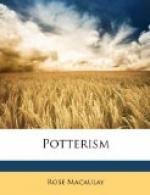We began in March. Peacock and I were the editors. We didn’t, and don’t, always agree. Peacock, for instance, believes in democracy. Peacock also accepts poetry; poetry about the war, by people like Johnny Potter. Every one knows that school of poetry by heart now; of course it was particularly fashionable immediately after the war. Johnny Potter did it much like other men. Any one can do it. One takes some dirty, horrible incident or sight of the battle-front and describes it in loathsome detail, and then, by way of contrast, describes some fat and incredibly bloodthirsty woman or middle-aged clubman at home, gloating over the glorious war. I always thought it a great bore, and sentimental at that. But it was the thing for a time, and people seemed to be impressed by it, and Peacock, who encouraged young men, often to their detriment, would take it for the Fact, though that sort of cheap and popular appeal to sentiment was the last thing the Fact was out for.
Johnny Potter, like other people, was merely exploiting his experiences. Johnny would. He’s a nice chap, and a cleverish chap, in the shrewd, unimaginative Potter way—Jane’s way, too—only she’s a shade cleverer—but chiefly he’s determined to get there somehow. That’s Potter, again. And that’s where Jane and Johnny amuse me. They’re up against what we agreed to call Potterism—the Potterism, that is, of second-rate sentimentalism and cheap short-cuts and mediocrity; they stand for brain and clear thinking against muddle and cant; but they’re fighting it with Potterite weapons—self-interest, following things for what they bring them rather than for the things in themselves. John would never write the particular kind of stuff he does for the love of writing it; he’ll only do it because it’s the stunt of the moment. That’s why he’ll never be more than cleverish and mediocre, never the real thing. In his calm, unexcited way, he worships success, and he’ll get it, like old Pinkerton. Though of course he’s met plenty of the bloodthirsty non-combatants he writes about, he takes most of what he says about them second-hand from other people. It’s not first-hand observation. If it was, he would have to include among his jingoes and Hun-haters some fighting men too. I know it’s entirely against popular convention to say so, but some of the most bloodthirsty fire-eaters I met during the war were among the fighting men. Of course there were plenty of them at home too, and plenty of peaceable and civilised people at the front, but it’s the most absurd perversion of facts to make out that all our combatants were full of sweet reasonableness (any one who knows anything about the psychological effects of fighting will know that this is improbable), and all our non-combatants bloody-minded savages. Though I don’t say there’s nothing in the theory one heard that the natural war rage of non-combatants, not having the physical outlet the fighters had for theirs, became in some few of them a suppressed Freudian complex and made them a little insane. I don’t know. Anyhow to say this became the stunt among a certain section, so it was probably as inaccurate as popular sayings usually are; as inaccurate as the picture drawn by another section—the Potter press section—of an army going rejoicing into the fight for right.




